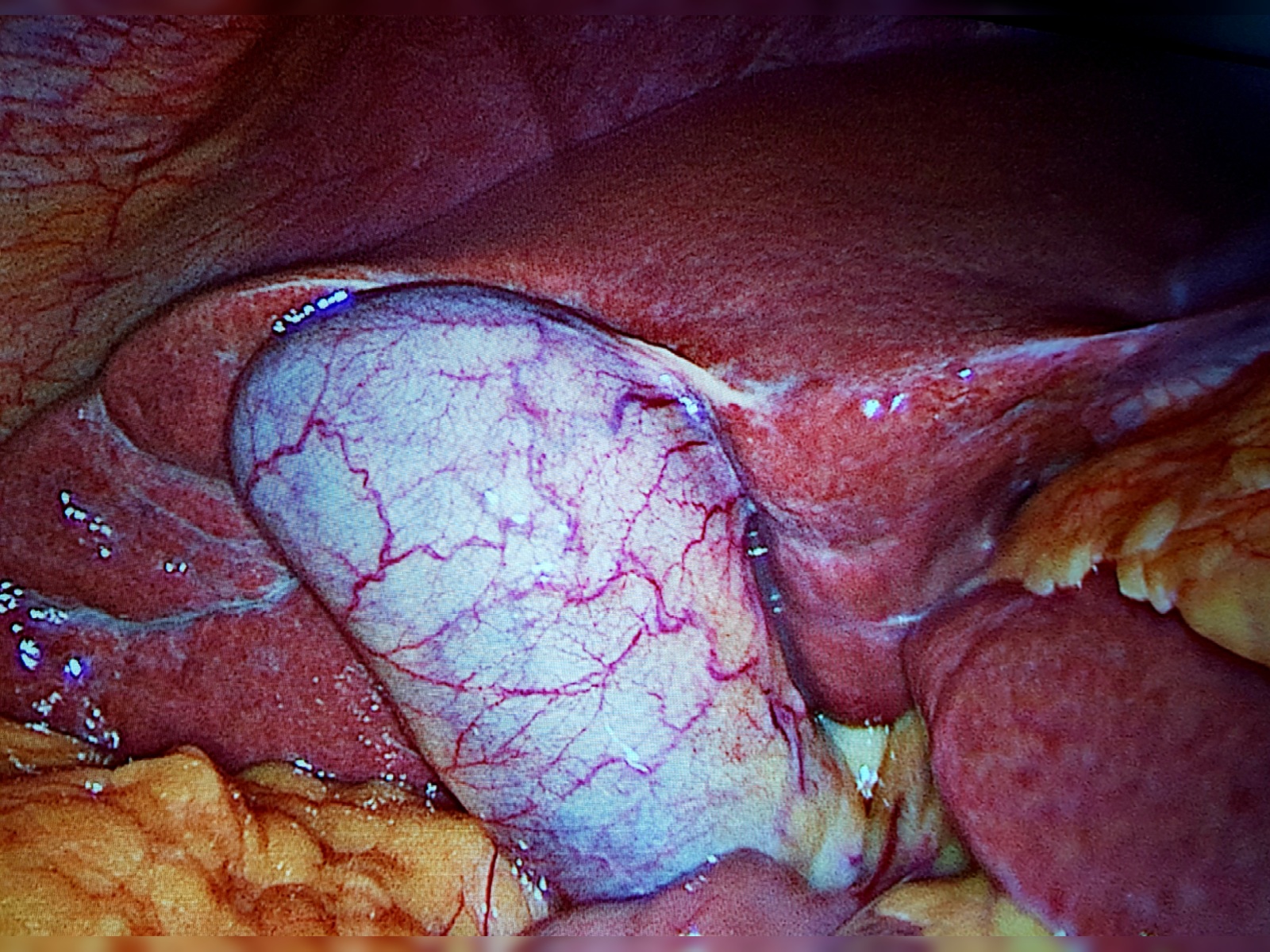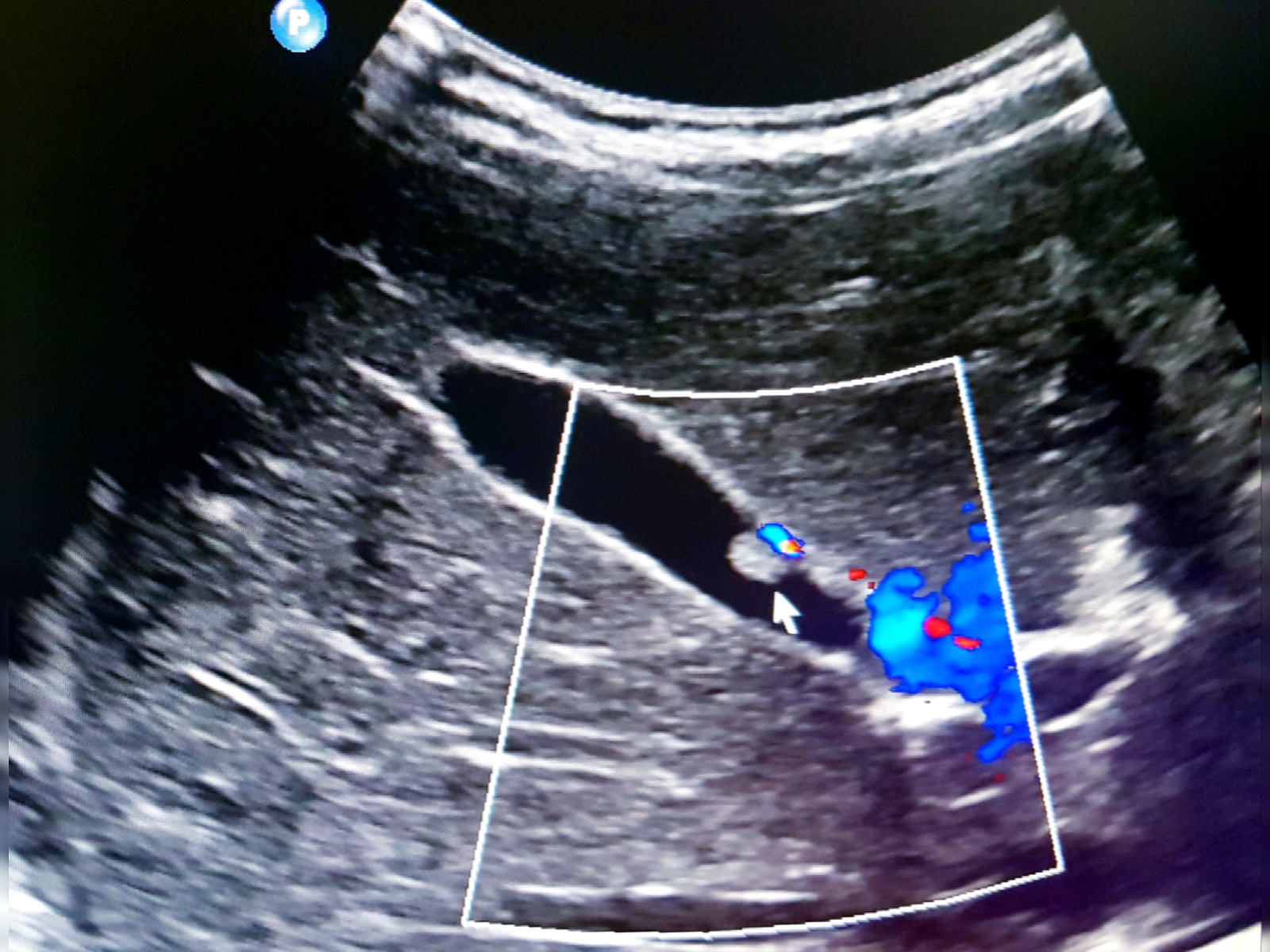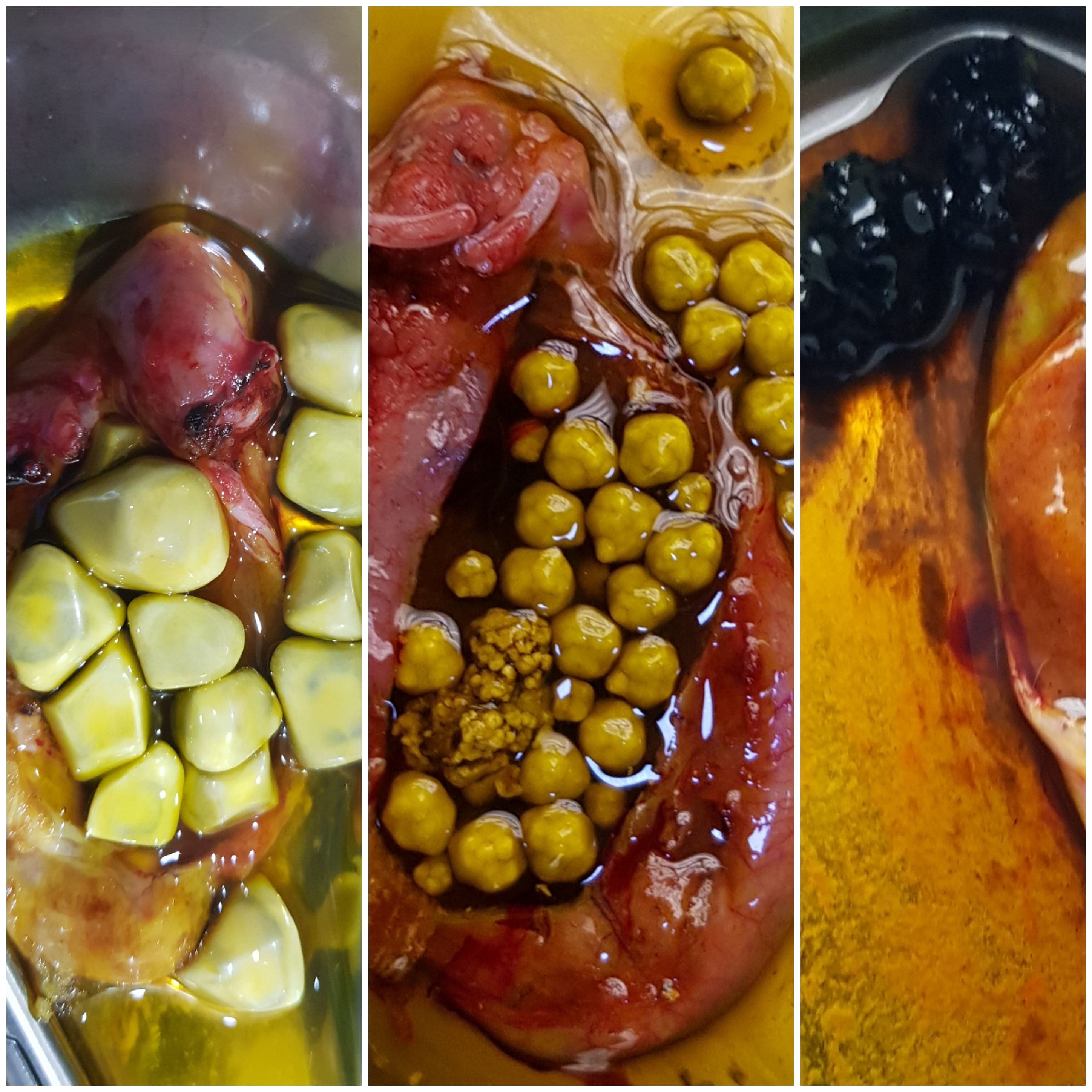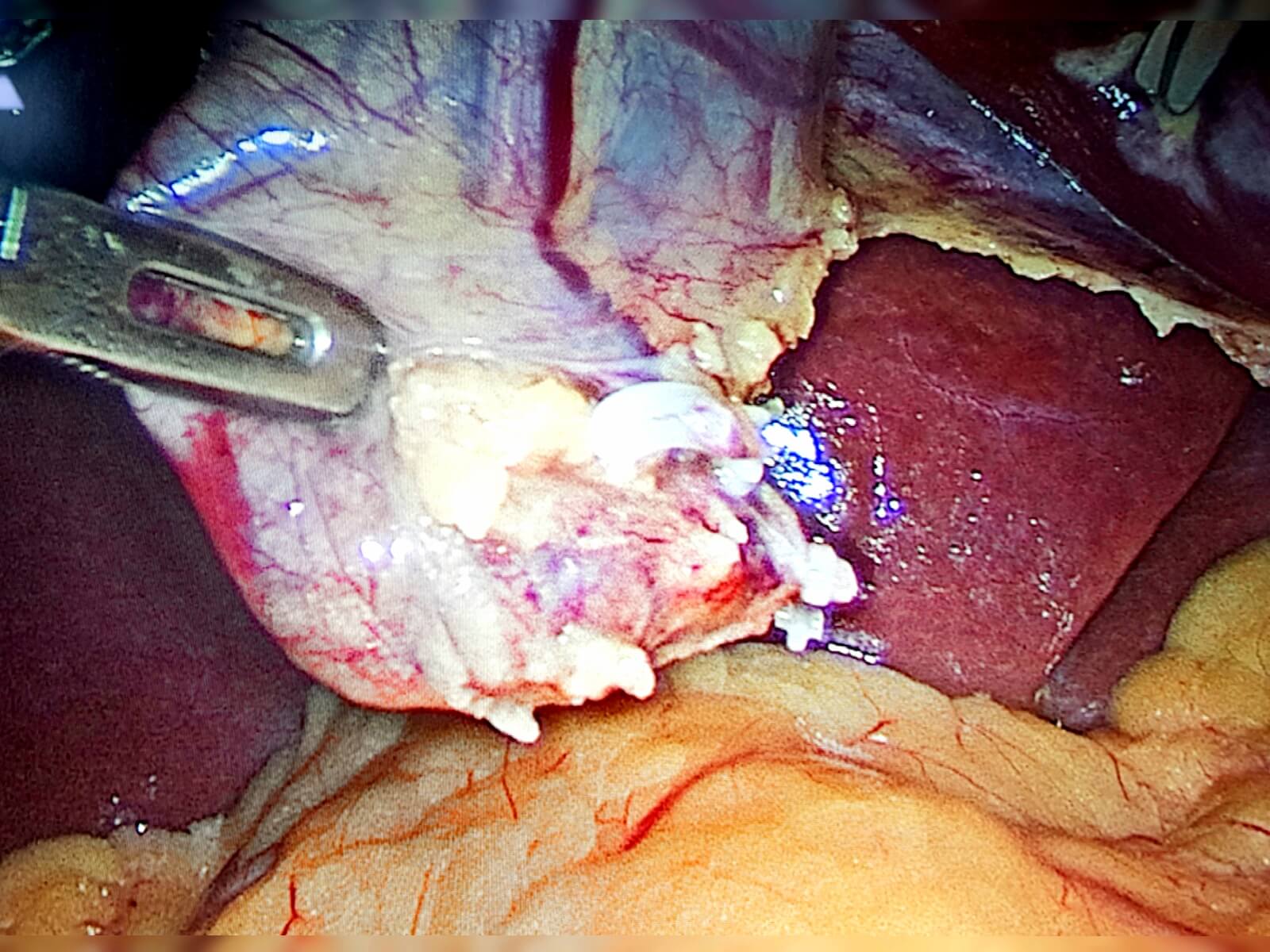-



.jpg)
Gallstone disease is the most common disorder affecting the biliary system. These are deposits of hardened digestive fluid (bile and cholesterol). Gallstones come in various sizes and shapes. These can be as small as a few millimeters in size to as large as a golf ball.
Gallstones commonly are made of cholesterol. Some gallstones are made of pigments ( Biliverdin or Heme ) commonly affecting patients having blood disorders. However, the majority of gallstones are cholesterol stones. The majority of the stones can be detected using an ultrasound abdomen.
Hardened deposits of digestive fluid form in the gallbladder, these hard deposits are referred to as gallstones. The gallbladder is a small organ under the liver and a part of our digestive system which stores bile. Bile is used to break the fats into fatty acids, which can be taken into the body by the digestive tracts.
This hardened deposit in the gallbladder blocks the tubes via which bile flows out of our gallbladder in your intestine. Bile duct infection can cause serious medical conditions like jaundice, and severe pain and potentially results in blockage of the pancreatic ducts.
Gallstone Symptoms
Gallstones can cause severe pain which can last for several minutes to hours, The pain can be felt in the center of your abdomen. In both males and females gallstone symptoms occasionally cause serious issues if they obstruct the flow of bile for a longer period. In some cases, it is seen that gallstones move into the pancreas or small bowl.
Major symptoms of gallstone are:
- High temperature
- Sudden or persistent pain in the center of your abdomen
- Increase in the heartbeat
- Jaundice
- Itchy skin
- Diarrhea (in some cases dark color urine and light-coloured poop)
- Chills
- Loss of appetite
- Nausea or vomiting
- Back pain between your shoulder blades or in the right shoulder.
It is seen that pain due to gallstone can occur any time of the day, sometimes the pain is triggered due to consuming fatty foods.
Gallstones Causes
The general cause of gallstone is when your body has too much cholesterol and bile can not break down them. This hardened form into stone and blocks the gallbladder. Other reasons include bilirubin in your bile, which is due to blood disorders or cirrhosis infections.
Gallstones Prevention
There are a few prevention methods which can help you to keep the gallstone away, most of them are mentioned below:
- Eat a high-fiber diet.
- Eat refined carbohydrates and less sugar.
- Eat healthy fats like olive oil, and fish oil (consuming healthy fats keeps your gallbladder empty)
- Do regular exercise and keep your body fit.Gallstones Diagnosis
There are many diagnoses processes for the gallstone, before going to prescribe any test doctors take an overview of your history of symptoms and signs you have faced. Generally, patients have seen extreme abdominal pain for hours which helps in the diagnosis.
There are multiple methods to diagnose your gallstone, they are:
- Abdominal ultrasound
- Computed tomography scan (CT)
- Magnetic resonance imaging (MRI). ...
- Cholescintigraphy
- Endoscopic retrograde cholangiopancreatography (ERCP).Gallstones Treatment
The gallstone treatment varies on the size of the stone, as small ones pass through your body on their own. In serious cases, doctors remove the gallbladder by performing surgery. Doctors use two types of methods, Laparoscopic cholecystectomy surgery and Open cholecystectomy which depends upon the case,
Our team of highly experienced surgeons and specialists are known to perform such surgeries for years. We are known for providing best in class medical treatment to our patients. If you are facing any symptoms consult our specialists or visit us.
-
Surgery


There are two types of surgeries that are offered for patients suffering from gallstones or diseases related to the gallbladder. Open Cholecystectomy and the other most common type of surgery is Laparoscopic Cholecystectomy. Broadly these surgeries based on the technique can be classified as OPEN SURGERY and MINIMALLY INVASIVE SURGERY.
OPEN SURGERY- Open Cholecystectomy
Open surgery involves an open technique. Here an incision is made on the right side of the abdomen called KOCHER'S incision. The abdomen is entered and the gallbladder is found under the liver. The gallbladder with stones is removed in an open technique. The cystic duct and the other surrounding structures are evaluated and the incision is closed.
Open surgery is usually more painful than minimally invasive surgeries. But there are various medications that we use to help you have better pain control.
For this surgery, you may need a complete blood count (CBC), chemistry profile, PT, PTT. Depending on your medical history, we may require additional testing: chest X-Ray, EKG, medical clearance from your primary care physician, cardiac clearance from your cardiologist, additional blood work, and finally Anesthesiology clearance.
We recommend that you have your blood work done before having the surgery performed. If this is not possible, please notify the surgical scheduling team at 8884200030.
MINIMALLY INVASIVE SURGERY- Laparoscopic Cholecystectomy
Laparoscopic surgery involves a minimally invasive technique. Here we make small 5mm incisions on the right side of the abdomen and small 10mm incisions near or at the umbilical area. The abdomen is entered and the gallbladder is found under the liver. The gallbladder with stones is removed after the cystic duct is clipped and divided. The cystic duct and the other surrounding structures are evaluated and the incision is closed.
Laparoscopic surgeries are usually less painful than open surgeries. We still give you pain medications and nerve blocks so that you feel comfortable and are able to walk about six hours after the surgery.
For this surgery, you may need a complete blood count (CBC), chemistry profile, PT, PTT. Depending on your medical history, your physician may require additional testing: chest X-Ray, EKG, medical clearance from your primary care physician, cardiac clearance from your cardiologist, additional blood work, and finally Anesthesiology clearance.
We recommend that you have your blood work done before having the surgery performed. If this is not possible, please notify the surgical scheduling team at 8884200030.
-
Patient education
BEFORE SURGERY
Please refer to the instructions below in preparation for your surgery. Proper preparation is essential to obtain the best surgical experience and results. Please note that failure to follow these instructions may result in rescheduling your surgery. Our team will contact each patient directly and will be available to answer any additional questions about surgery, scheduling and instructions.
PRE-OPERATIVE TESTING
You may need a complete blood count (CBC), chemistry profile, PT, PTT. Depending on your medical history, your physician may require additional testing: chest X-Ray, EKG, medical clearance from your primary care physician, cardiac clearance from your cardiologist, blood work and anesthesiology clearance.
We recommend that you have your blood work done at the hospital where you are having the surgery performed.Please download instructions below if you need any further instructions, please notify the surgical scheduling team at 8884200030.
-
why us?
Our minimally invasive Surgeons are well known internationally in their field. They are experts in the diagnosis and management of various conditions, and innovation of minimally invasive surgery techniques. Our team provides a personalized approach for each patient, offering advanced surgical solutions. Our surgeons educate physicians on innovative techniques through national,international presentations and web-based seminars.
Frequently Asked Questions
Answer:
Laparoscopic gallbladder surgery by the specialist laparoscopic surgeon in Bangalore is the best method of treating gallstones that cause symptoms, unless there is a reason that the surgery should not be done. Laparoscopic surgery is used most commonly when no factors are present that may complicate the surgery.
Answer:
Cholangiography was successfully performed in 97.1% of patients (83% success rate for open cholecystectomy, 98% for laparoscopic).
Answer:
Most people can return to their normal activities within 7 to 10 days. Hernia specialist in Bangalore suggests that people who have laparoscopic gallbladder surgery are sore for about a week. But in 2 to 3 weeks they have much less discomfort than people who have open surgery. No special diets or other precautions are needed after surgery.
Answer:
Dr. Manjunath Haridas is one of the best gastroenterologist doctor in Bangalore. His area of expertise includes Gastrointestinal Surgery - Colon Rectum, Foregut Advanced Laparoscopic Surgery and Minimally invasive surgery. He also performs Robotic Surgery, GI & Hernia, and Other common general surgeries. Complex Abdominal Wall Reconstruction Surgery and Surgical Oncology.
Answer:
The gallbladder surgeon in Bangalore says that stones in the common bile duct can be removed without surgery by using a scope. Removal of the gallbladder requires surgery, which is typically done laparoscopically (a minimally invasive surgical procedure).
Answer:
Answer:
Answer:
Answer: Laparoscopic gallbladder surgery is the best method of treating gallstones that cause symptoms, unless there is a reason that the surgery should not be done. Laparoscopic surgery is used most commonly when no factors are present that may complicate the surgery.
Answer: Cholangiography was successfully performed in 97.1% of patients (83% success rate for open cholecystectomy, 98% for laparoscopic).
Answer: Most people can return to their normal activities in 7 to 10 days. People who have laparoscopic gallbladder surgery are sore for about a week. But in 2 to 3 weeks they have much less discomfort than people who have open surgery. No special diets or other precautions are needed after surgery.
Answer: Dr. Manjunath Haridas one of the leading surgeons for Gastrointestinal Sciences at MIAS MH Surgery Clinic Bangalore-Whitefield. His area of expertise includes Gastrointestinal Surgery - Colon Rectum, Foregut Advanced Laparoscopic Surgery and Minimally invasive surgery. He also performs Robotic Surgery, GI & Hernia, and Other common general surgeries. Complex Abdominal Wall Reconstruction Surgery and Surgical Oncology.
Answer: Stones in the common bile duct can be removed without surgery by using a scope. Removal of the gallbladder requires surgery, which is typically done laparoscopically (a minimally invasive surgical procedure).

